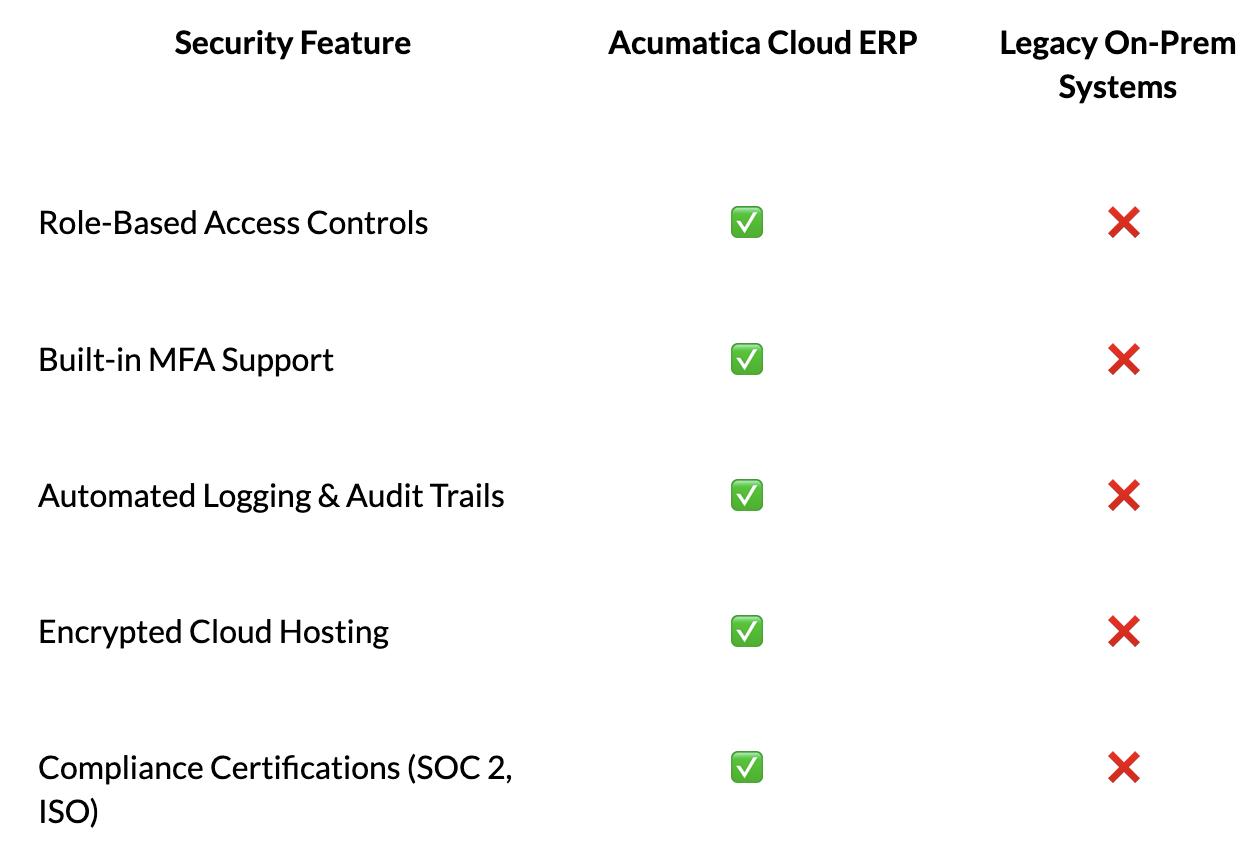5 ERP Security Best Practices to Protect Your Data
ERP security is more important than ever, especially for construction and engineering firms managing sensitive project data, financials, and client information.
As digital transformation continues to reshape the industry, protecting your ERP system isn’t just an IT concern. It’s a leadership responsibility.
Unique risks like decentralized teams, remote access, and high-value project bids make engineering firms an attractive target for cyber threats. Without strong ERP security measures in place, the risks are serious: project delays, financial losses, regulatory fines, and reputational damage.
What do you mean by ERP security?
ERP security refers to the policies, processes, and technologies used to protect an ERP system from unauthorized access, data breaches, and cyber threats. It involves everything from user access controls to encryption, backups, and audit trails (University of Alberta, 2023).
Let's break down what firms need to know—and how ReviveERP helps engineering firms secure their data every step of the way.
Common ERP Security Risks
Construction and engineering firms face several ERP-specific vulnerabilities. Here are the most common ones we see:
Misconfigured user permissions
Without strict ERP user roles and permissions, employees can access sensitive data they shouldn’t see, which increases the risk of accidental leaks or internal breaches.
Legacy systems with limited encryption
Older ERP systems often lack modern encryption standards, leaving data exposed during transmission or at rest.
Disconnected tools leading to data exposure
Using multiple disconnected software tools without proper integrations can create gaps in data security, leading to lost or compromised information.
Insider threats & lack of auditability
When firms don’t track user activity with audit trails, it’s difficult to identify unauthorized access, spot suspicious behavior, or respond to breaches.
Lack of multi-factor authentication (MFA)
Without MFA, a stolen password can give an attacker full access to sensitive financial and project data, putting the firm at serious risk.
Protect your projects, data, and reputation. Talk to ReviveERP today about building a more secure ERP system for your engineering or construction firm.
ERP Security Best Practices Every Firm Should Follow
How should an ERP system be secured? It starts with these five core practices:
1. Role-Based Access Controls (RBAC)
Limit what users can see and do based on their job role. For example, a field engineer doesn’t need access to payroll data. A CFO doesn’t need to edit project schedules. At ReviveERP, we can set up tailored access control ERP permissions for your office and field teams to minimize risk.
2. Multi-Factor Authentication (MFA)
Add an extra layer of protection by requiring users to verify their identity with a second factor like a text code or authentication app before accessing the ERP system.
3. Regular Software Updates & Patching
Outdated software is vulnerable software. Make sure your ERP platform and all related apps are updated regularly with the latest security patches.
4. Secure Cloud Hosting & Encrypted Backups
Choose a secure cloud ERP provider with strong encryption standards (at rest and in transit) and automatic, geographically diverse backups to protect your data from loss.
5. Automated Logging & Audit Trails
Implement an audit trail in ERP systems to automatically log user actions. This helps you spot unusual behavior early and provides full traceability if a security incident occurs.
Choosing a Secure ERP
What security mechanisms are implemented in ERP? When evaluating ERP solutions, look for features like:

A cloud-based ERP like Acumatica, with SOC 2 and ISO certifications, offers stronger protection compared to legacy, on-premise systems that often lack encryption and secure remote access.
Security gaps cost more than you think. Let’s strengthen your ERP system and safeguard your operations. Contact ReviveERP today.
What Happens Without ERP Security
In one case we’ve seen, a mid-sized engineering firm failed to configure user roles properly and a junior project coordinator accidentally accessed and emailed confidential client financials which led to regulatory scrutiny and a breach of contract penalty.
In another example, a firm running an outdated ERP system without MFA experienced a ransomware attack after an employee’s credentials were stolen through phishing. Recovery costs exceeded $250,000.
How ReviveERP Helps Engineering Firms Stay Secure
At ReviveERP, we specialize in helping construction and engineering firms strengthen their ERP security posture. Here’s how:
- Acumatica’s Built-In Security Features: Cloud ERP security, SOC 2 compliance, encrypted backups, and real-time user activity monitoring.
- Secure User Role Setup: We design ERP user roles and permissions that match field, finance, and executive teams’ needs without overexposing data.
- Approval Workflows: Sensitive financials and project approvals are protected by role-based workflows and multi-level approvals.
- Audit Logs: Automated logging and custom reports help firms maintain compliance and investigate incidents quickly.
- Ongoing Training: We provide hands-on training to help clients maintain ERP compliance best practices post-go-live.
Strong ERP Security Starts at the Top
Protecting your ERP system isn’t just IT’s responsibility, it’s a firm-wide initiative.
CFOs, project managers, and leadership teams must all prioritize ERP data protection, role-based access controls, auditability, and regular security updates.
Security best practices today prevent security disasters tomorrow.
Ready to secure your ERP system? Contact ReviveERP today to learn how we help engineering and construction firms protect what matters most.
ERP Security FAQs
What do you mean by ERP security?
ERP security refers to protecting enterprise resource planning systems from unauthorized access, cyber threats, and data breaches by using measures like encryption, access controls, and audit trails.
How should an ERP system be secured?
An ERP system should be secured through role-based access controls, multi-factor authentication (MFA), regular updates, secure cloud hosting, encrypted backups, and automated audit logging.
What security mechanisms are implemented in ERP?
Modern ERP systems like Acumatica implement role-based access, MFA, encryption, automated logging, and compliance with SOC 2 and ISO standards to protect against ERP system vulnerabilities.








